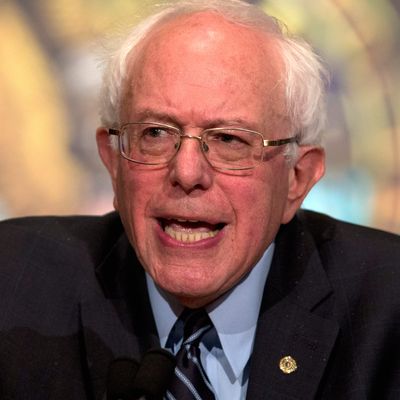
Bernie Sanders calls himself a socialist in the same spirit that an overweight comedian calls himself fat — to reclaim the term that his enemies use to deride him. That’s the impression left by the lengthy address Sanders delivered on the virtues of democratic socialism Thursday.
The Independent senator turned Democratic presidential candidate began his remarks at Georgetown University by extolling the economic vision of Franklin Roosevelt.
“Roosevelt implemented a series of programs that put millions of people back to work, took them out of poverty and restored their faith in government,” Sanders said. “And, by the way, almost everything he proposed was called ‘socialist.’ Social Security, which transformed life for the elderly in this country was ‘socialist.’ The concept of the ‘minimum wage’ … socialist. Unemployment insurance, abolishing child labor, the 40-hour work week … ’socialist.’”
Sanders went on to note that the s-word was also used in attempts to delegitimize Lyndon Johnson’s Great Society programs. But neither Roosevelt nor Johnson ever described his own policies as socialist, and the Vermont senator never clearly explained why he favors the term used by their reactionary opponents. In one sense, accepting the rhetorical framework of the right-wing would seem to run directly against the central mission of the Sanders candidacy: If your goal is to shift the economic debate leftward, why encourage Americans to define New Deal liberalism as anti-capitalist?
Sanders’s implict answer to this critique seems to be that democratic socialism’s radical connotations help communicate the radical change that it will take to implement Roosevelt’s Four Freedoms in the post-Reagan United States. And in Sanders’s telling, it’s only the “democratic” part of that phrase that is truly radical.
“This country has socialism for the rich and rugged individualism for the poor,” Sanders said, quoting Martin Luther King, Jr., then he proceeded to remind his audience of the ways the U.S. government has subsidized Wall Street’s success through bank bailouts and favorable trade agreements.
By contrast, Sanders suggested that under democratic socialism the state would use its power to ensure the employment of its workers, rather than the profitability of its banks. “Democratic socialism means that our government does everything it can to create a full employment economy,” he said.
Still, Sanders took pains to clarify that he’s no socialist’s socialist — insisting that he doesn’t believe that the government should “own the means of production” and that he admires “private companies that thrive and invest and grow in America.”
Finally, just when his speech reached its logical ending place, Sanders suddenly started talking about ISIS.
One week after ISIS militants terrorized Paris, and just an hour after his rival for the Democratic nomination delivered a stem-winding foreign-policy address, Sanders had no choice but to devote a substantial portion of his remarks to matters of national security.
As usual, Sanders’s foreign-policy proposals weren’t as detailed and deeply felt as his domestic ones. Sanders’s national-security platform has five essential parts:
1. Don’t recklessly overthrow foreign regimes or enter any war that doesn’t directly impact American interests.
2. Get the Gulf states to contribute their fair share to the fight against ISIS. If Qatar can afford to spend $200 billion on some soccer tournament, Sanders reasoned, they can afford to send more soldiers and airplanes to the battlefield. Similarly, he noted that Saudi Arabia has the world’s third largest defense budget, but is prioritizing its war against the Houthi rebels in Yemen over defeating ISIS.
3. Use American diplomatic might to build a global coalition against terrorism.
4. More airstrikes.
5. Implement democratic socialist economic reforms.
Quoting Roosevelt, Sanders argued that America will never spread a lasting peace overseas until it achieves economic security for all its own citizens.
“I’m not running to pursue reckless adventures abroad, but to rebuild America’s strength at home,” Sanders said.
To execute that rebuilding, Sanders will have to convince the American people to love democratic socialism more than they fear jihadist terrorism. For now, Clinton leads national polls by more than 20 points.






























